How Much Does it Cost to Drop Everything and Travel Asia for 3 Months?
A one-way ticket. A backpack. An idea.
That’s all we had.
Over the next three months, May and I would watch a tea ceremony, crash a motorbike, wake up for sunrise with throngs of tourists, drink cheap whiskey with local tattoo artists, order the wrong food, love it anyway, watch fire-dancers in a jungle, and make new life-long friends.
We ended up visiting 23 cities in 6 countries.
And since you were wondering but are too polite to ask: it cost $7010 per person*.
That’s $2965 less than we would have spent at home.
Budget Breakdown for 3 Months in Asia

Let’s breakdown that $7010*, so you can get a better idea of how much it’d cost you to take on a similar endeavor. We’ll also explain that little asterisk hovering next to the total cost.
For reference, we spent three weeks in Japan, two weeks in China, three weeks in Vietnam, a few days in Cambodia, two weeks in Thailand, and a week in Taiwan.
We’ll write prices per person, but note that travelling with a buddy makes everything cheaper.
Budget Breakdown:
Travel Between Countries / Cities: $2308
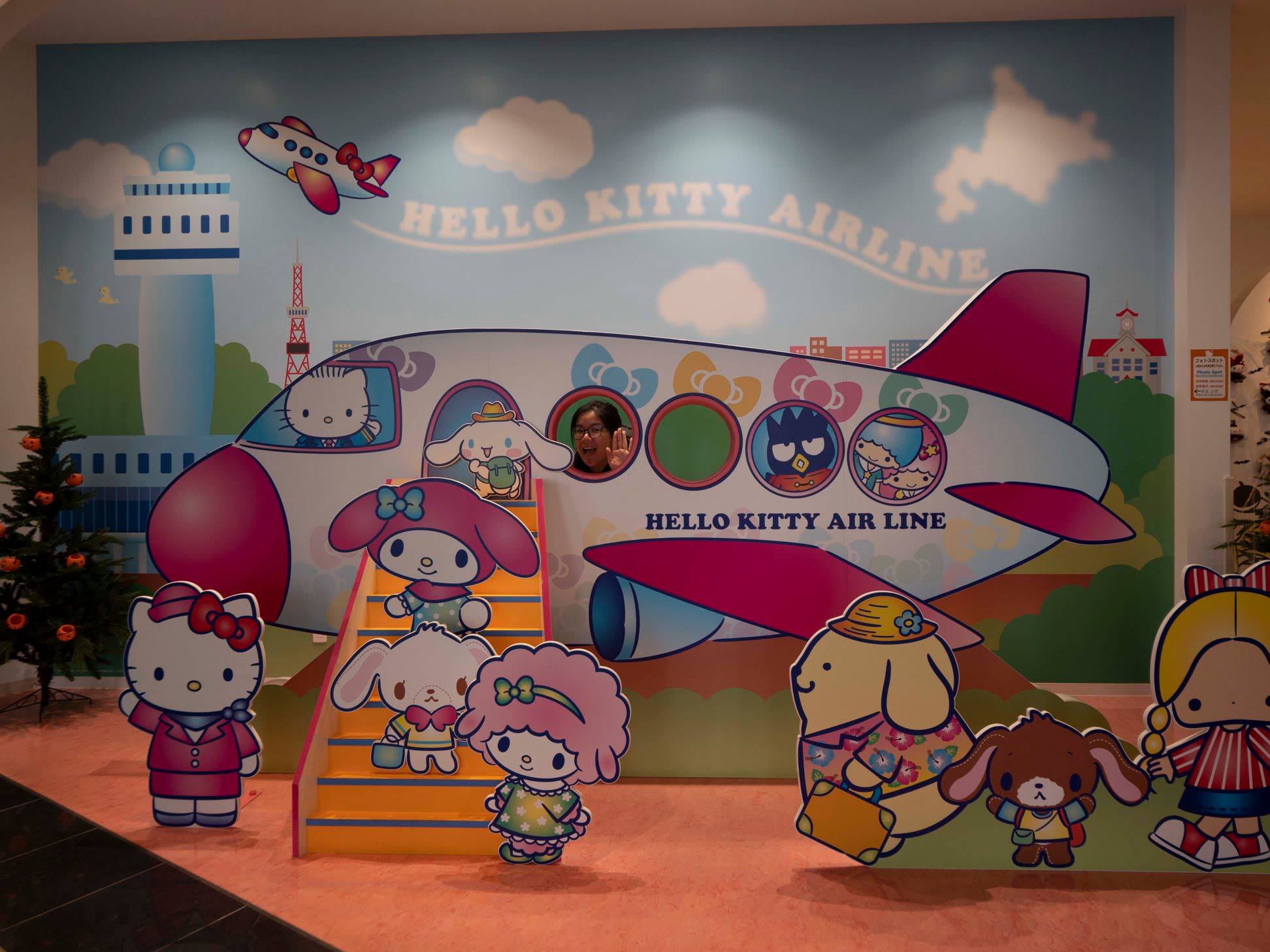
*We only fly the best airlines*
Intercontinental flights are expensive. Well, expensive is the wrong word. It’s a miracle that you can travel 5000 miles in a pressurized aluminum can at Mach 0.9 and wind up in a different continent for only $450. Still, a big chunk of your budget will go towards flights, and there’s room to save.
For longer flights, we made the extra effort to find cheap fares. We also used points to cover a flight from China to Vietnam. Once in Asia, flights via budget airlines are cheap, in the range of $50-70.
About a fourth of our travel costs were spent on the Japan Rail Pass. This saved us money compared to the normal fare for bullet trains, which can get astronomical quickly.
How to save money on flights and trains:
- Stay closer to home
- Substitute high-speed rail for slower buses
- Use a flight notification service like Scott’s Cheap Flights
- Travel to fewer countries
- Choose countries with cheaper modes of transportation. A two-hour bullet train ride in Japan costs around $130. Compare to the three-hour train ride we took in China: $40, with a similar top speed.
Lodging: $1132

Booking a bunk bed instead of private room: $6. Three AM wake-up-calls from drunk strangers seeking condoms: priceless.
We stayed primarily at hostels, with the occasional Airbnb. Hostel dorms work well most of the time, but one or two asshats can make for a bad experience. If you’re traveling with a friend, look at getting a private room. It might only cost a few dollars more.
Lodging in Japan can vary from $30 a night to “I don’t make that much in a month” a night. We saved money by staying with friends in Tokyo. Elsewhere in Asia, hostels are cheap: ~$7 a night for a bunk and ~$25 a night for a private room are typical.
How to save money on Lodging:
- Choose countries with cheaper lodging
- Opt for hostels and Airbnbs
- If you stay in a dorm, bring earplugs
- Have friends in expensive cities
Food: ~$1700

May and I do things like stand in line for 3 hours to try ramen. Food is a priority. This is the only category where we spent more than we would have at home.
Unfortunately, accounting here is fuzzy. We used cash for multiple categories: lodging, food, and local transit. This makes it hard to pin down exactly how much was spent on food.
Things I remember from Japan: food, architecture, food, transit, being stuffed all the time, and food. I’m guessing nearly half of our food budget was spent in Japan over just 3 weeks.
Food in China is cheaper. Pop-in to a restaurant, point at what someone else is having, and you’ll get a meal in the $3-5 range. If you must, prices for ‘Western’ food are in-line with what you’d see in a mid-tier Western city.
Best food of the trip? We ate it squatting on tiny plastic chairs. On a sidewalk in Hanoi. Next to insane motorbike traffic.
In South East Asia, meals are a buck or two, beer is cheaper than water, and a fancy restaurant might cost $25 for two. The fancy restaurant will have worse food.
How to save money on food:
- Get recommendations from locals, or look for crowded restaurants
- Avoid tourist traps, these are often highly rated on TripAdvisor
- In Japan, opt for grocery stores and convenience shops over restaurants
Protip for withdrawing cash: a Schwab debit card will refund all ATM transaction fees, worldwide.
Local Transit: ~$315
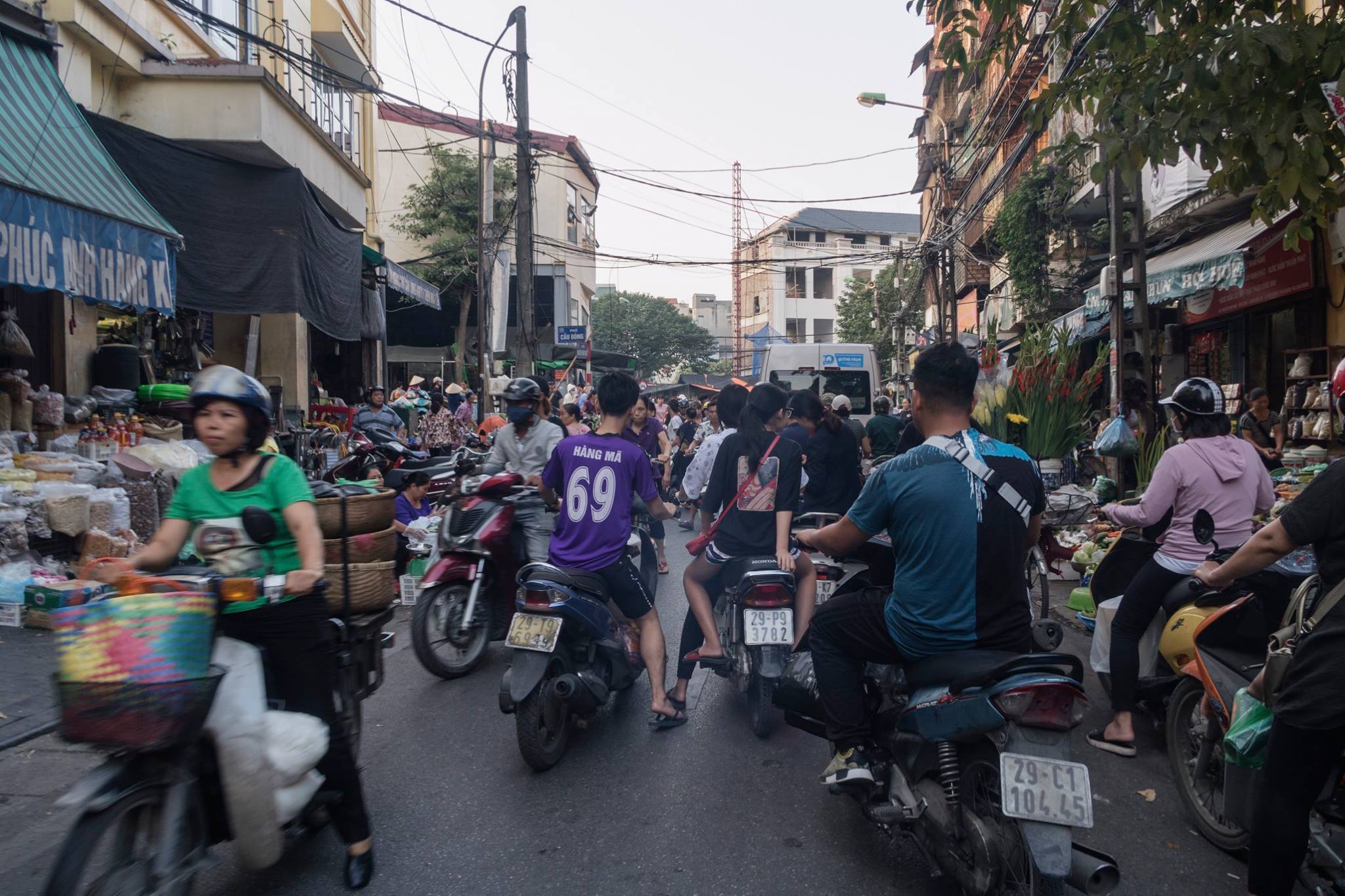
*Crossing the street in Hanoi is a test of wills*
Again, more fuzzy accounting because we used cash.
Local trains in Japan were mostly covered by our Rail Pass, itemized in the first section. Taxis are prohibitively expensive, and best avoided if possible.
Grab is Asia’s version of Uber. It’s reliable. Usually. We’ve had drivers who would drive away from us instead of cancelling. Rides are in the $2 range.
Big cities in China are littered with bike shares. Whip out your phone, download the app, and ride away–well, that’s what the locals did. We couldn’t figure out how to get any of the companies to take our money without a Chinese bank account. So we walked.
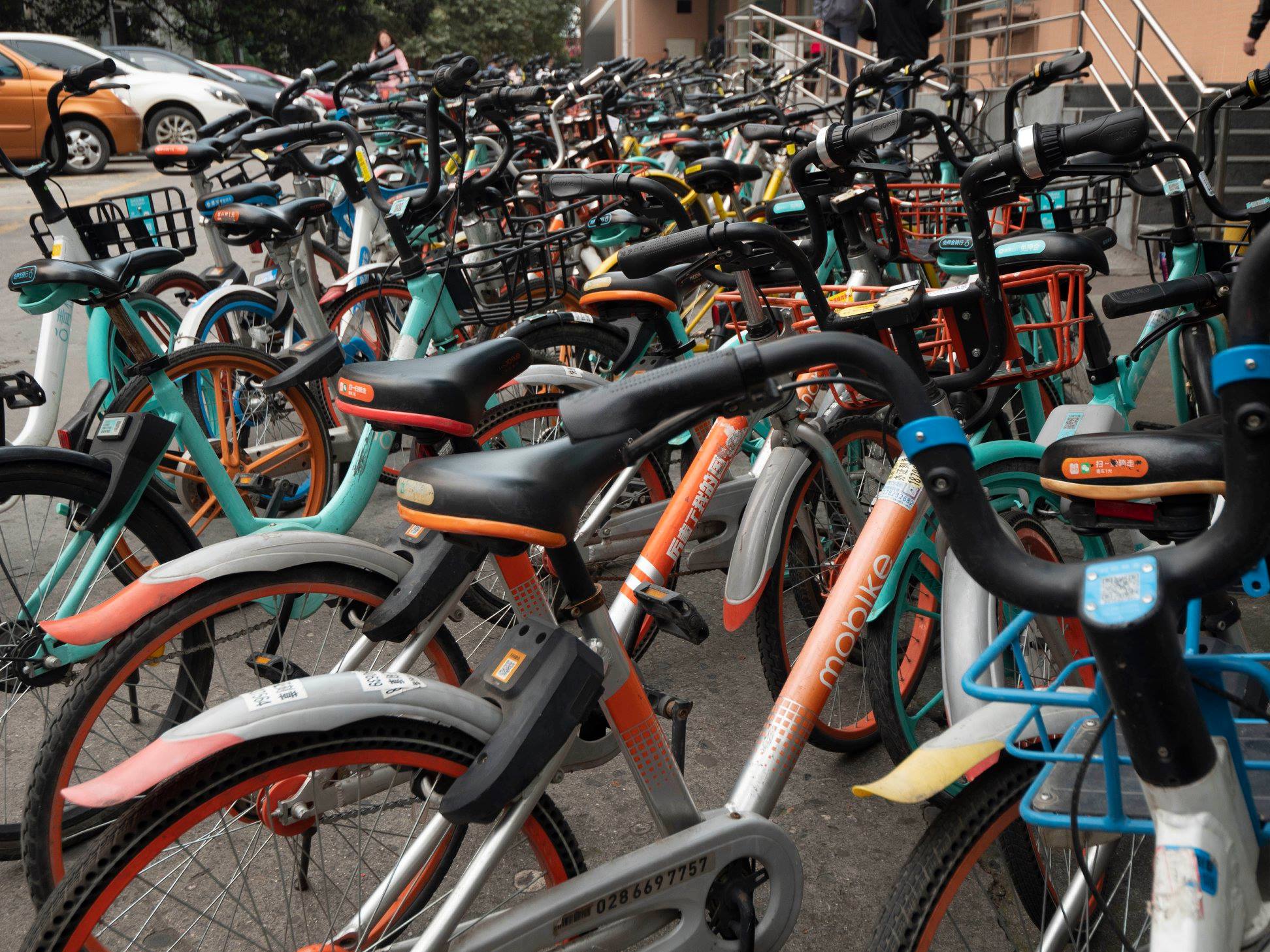
*Share bikes we couldn't use*
Tuk Tuks are common in Bangkok, Thailand, and often decked out with cool lights and sound systems. They’re usually expensive, but so are Taxis. Negotiate a price beforehand.
Head to Chiang Mai Thailand and you’ll see red trucks everywhere. Let the driver know where you’re going and hop in the back with some new friends; these Songthaews are like ad hoc uber-pools and only cost ~$0.60.
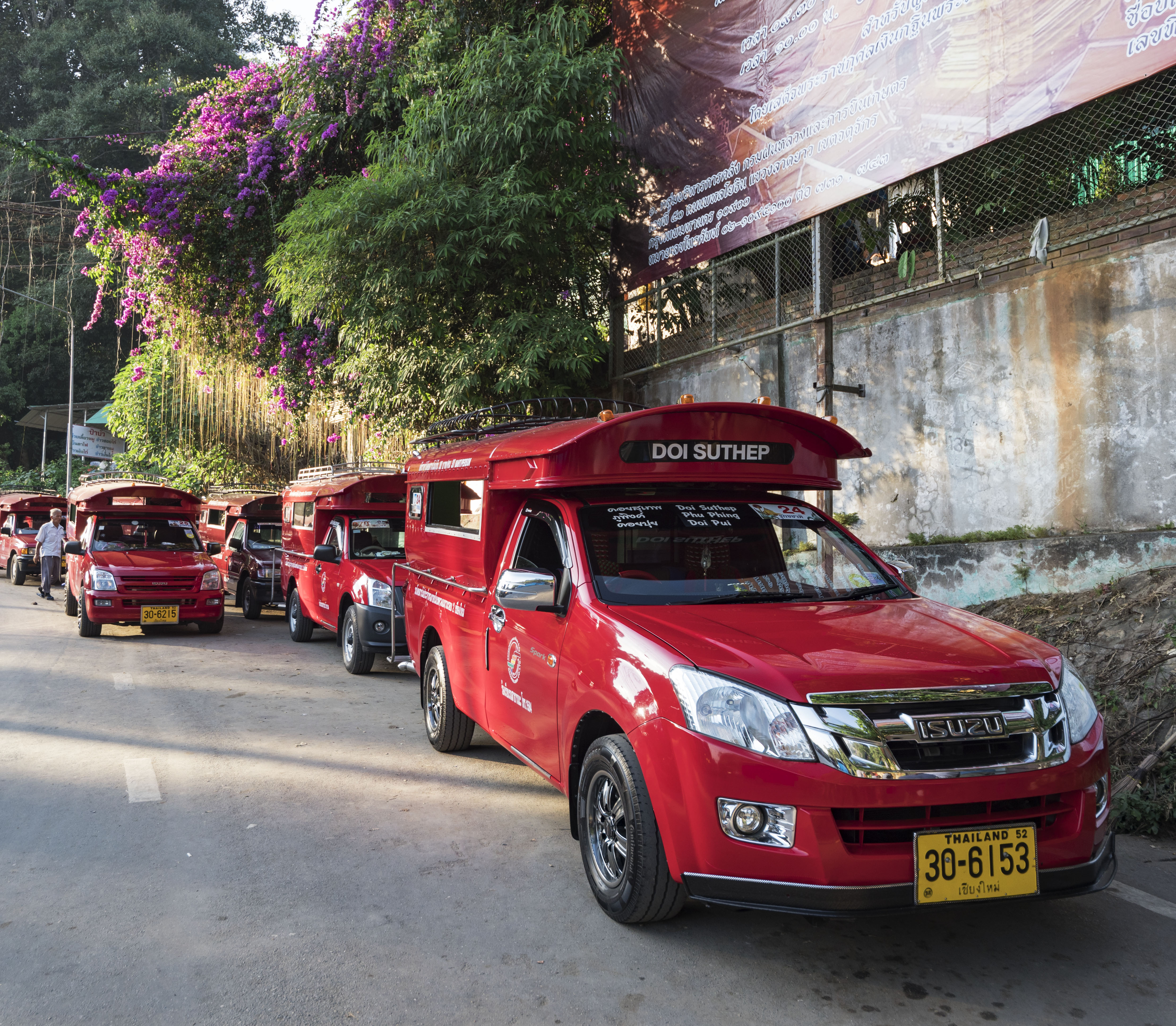
Biggest costs are rides to and from airports. Before arriving in a new city, check WikiVoyage for the best way to get from the airport to your hostel, or ask the hostel beforehand.
How to save money on local transit:
- Check if there’s a transit pass for tourists
- Walk more
- Never follow a hawker advertising a cheaper ride
- Always agree on a price before getting in a vehicle, or demand they use the meter
Travel Gear etc: $561
I spent more time thinking about my packing list than our travel itinerary. Don’t be like me.
We bought fancy ‘digital-nomad’ backpacks, merino wool clothing, and other travel gadgets which raised the costs here.You could easily do the same thing with a cheap backpack and clothes you already have.
Pack less than you think you need, then remove another item or two. You can always buy something in the country you’re travelling to.
Great resources for packing light:
Visas: $195
Most of this was for a 10-year China Visa. Other countries that need visas are on the order of $25-$40.
Protips:
- Bring USD or Euros for Visa fees in Vietnam and Cambodia
- Bring extra passport photos, or be like us and search all afternoon for a shop that’ll take your photo.
Vaccines: $45-1200
Nothing like getting hit with a $1150 bill before leaving the country. May’s insurance wouldn’t cover a rabies vaccination, which ended up costing her an absurd amount of money.
Talk to your doctor about vaccinations before visiting foreign countries.
Travel Insurance: $217
Don’t stick your family with a huge bill to repatriate your body 😱. Get travel insurance.
We purchased Travel Insurance from World Nomads. Setup was straightforward, and the price is more than reasonable.
Thankfully we never had to use it, so we can’t report on the claim filing process.
Tours etc: $582

*Ha Long Bay, Vietnam*
Best way to explore a new city: Food Tours. Take a food tour first thing after arriving. You’ll get an idea of areas to explore more, and try some dishes you didn’t know existed. If food isn’t your thing, city tours are a great option.
More than half of this budget was spent on a private boat in Ha Long Bay. Well worth it to avoid the crowds.
The rest was spent on food related tours, cooking classes, or massages.
In Vietnam we went on four tours with OneTrip and had a great experience every time. Highly recommend.
Opportunity Cost: ???
“I thought Americans only got two weeks of vacation a year?” – everyone we met, upon learning we were Americans on an extended trip.
It’s true, and even two weeks is not guaranteed. This means us Yanks either have to quit our jobs or get good at sweet talking our bosses.
How did we do it?
- May quit her job.
- I’m lucky enough to work for a company willing to take me back after 3 months pfaffing about on the other side of the planet. I worked part-time while abroad.
- We timed our trip with the end of our apartment lease.
Three months without work is three months without a paycheck, lost career advancement opportunity, and a big black hole on your resume. You also have to get rid of everything that won’t fit in a backpack, or figure out where to store it.
Well worth it.
How Much Will Your Extended Travel Cost?
Less than you’re paying right now to stay at home.
Before this trip my monthly outlay averaged $3325. It cost me less to bounce around 6 different countries on the other side of the planet, than to stay put in an ‘open 1-bedroom’ apartment in Seattle.
This is what Digital Nomads have figured out: if you can divorce your income generation from your location, travelling abroad can actually save you money. This flips opportunity cost calculations on their head.
Something to think about.
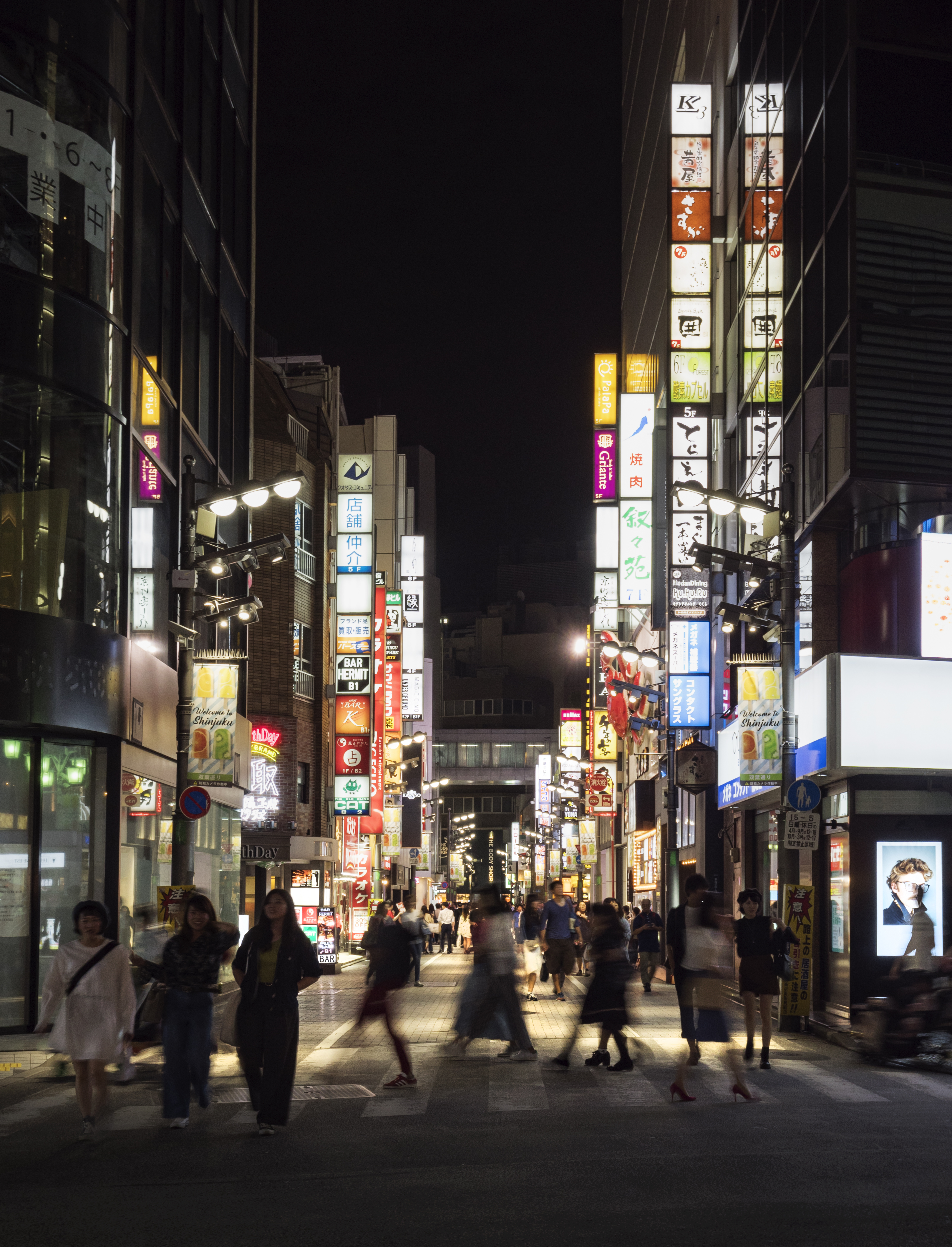
In this article we’ve broken down a rough costing for our trip, but if you decide to travel around for 3 months it probably won’t cost exactly $7010*. This kind of trip can be done for less, or, if you have the cash, much much more.
Take some time to think about your priorities. Love food? It’s worth it to spend more time or money finding the best restaurants. Love fancy hotels with great service? Maybe skip the 12-bunk hostel dorm. Spend more on the experiences you care about and cut costs elsewhere.
If you need to go cheaper, it’s better to:
- Go to fewer countries, move less.
- Stay in cheaper countries.
- Use the gear you already have.
If can afford to spend more, it’s worth it to:
- Get a private room all of the time
- Get a hostel closer to transit lines
- Prioritize shorter flights/trains/buses over cost
- Splurge on aspects of travel that you really enjoy: exclusive tours, expensive restaurants, shopping, etc. Spend more on the things that you enjoy, not just what everyone else is doing.
Are you thinking about taking an extended trip? Where to?